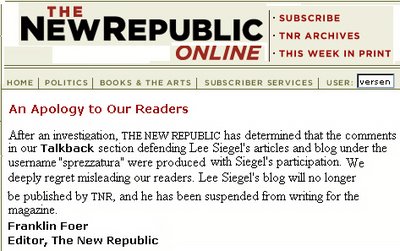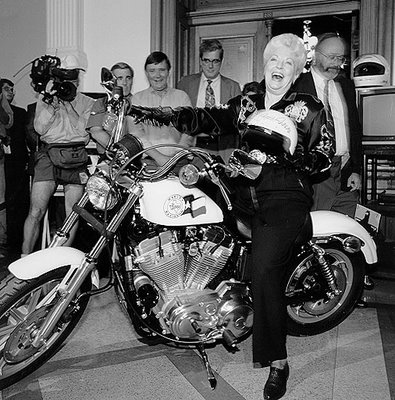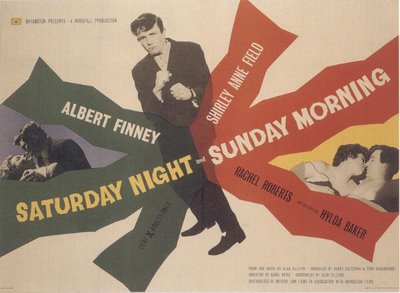 [I guess this means that I need to clean up my act too. I can no longer allow more false hosannas of praise from TallyHo77, Lucretia Cunningham or Biff Menchaca, and I guess it's over between Lori Jo Witherspoon and me, especially since my other imaginary girlfriend was getting jealous. And there wont be any guest blogging by Andrei Sacharov when I'm gone on vacation. Damn.]
[I guess this means that I need to clean up my act too. I can no longer allow more false hosannas of praise from TallyHo77, Lucretia Cunningham or Biff Menchaca, and I guess it's over between Lori Jo Witherspoon and me, especially since my other imaginary girlfriend was getting jealous. And there wont be any guest blogging by Andrei Sacharov when I'm gone on vacation. Damn.]I subscribed to
The New Republic from 1990 until 2002, a big chunk of my life, from the age of 26 till I was nearly 40, and for the longest time I saw their writers as fine thinkers who offered models of cogitation to aspire to. I grew disenchanted with
TNR in 2002 as they joined the crazy, unreflective drumbeat for war against Iraq, undoubtedly in no small part because my mother's family is from there. Maybe the "not in my backyard" phenomenon is not the noblest reason for people to become more aware, but there it is. (Like Al Gore in 1990-91, I did agree with
TNR that Desert Shield/Desert Storm
was a legitimate use of US force. I wasn't sure about George Senior's decision not to expand the war for Kuwait into a war against Saddam's hold on power, but I recognized that a lot of the people who supported expanding the 1991 military mission
weren't doing so out of a sincere desire to liberate the people of Iraq, but were simply racist right-wing hawks, and questioning their motives made me question the validity of their reasoning, both in 1991 and later even more so in 2002-2003.)
But back to
The New Republic. Sure, I always found the pompous style of their editorials off-putting, but I figured that was just one of those things you make allowances for. Perhaps ironically, I discovered the lefty blogosphere precicely because of
TNR, reading the TRB byline of Andrew Sullivan in which he alsways noted that you could check out his website,
www.AndrewSullivan.com, and when I finally did I saw he was even more of a reactionary with a big vocabulary than I'd previously realized. Nevertheless, back in 2002 the political blogosphere was still pretty small, and at that time he linked to
Avedon Carol and
Bill Scher and even Steve Baum of
Ethel the Blog, and thanks to them I realized how straight-jacketed my views had become in the 90s, wowed as I was( as millions were), by Clintonian "third-way" neoliberalism, leading many of us to believe it really was the answer to all of society's woes.
Sure, there were some cracks in that vision, even before 2002. By 1998-99, when Clinton attacked that Sudanese pharmaceutical plant in the midst of the Lewinski hearings, it had grown pretty obvious that periodic airstrikes against Saddam were occurring mainly because of political expedience and it was highly unlikely that Saddam posed a threat to anyone besides the occasional pipsqueak Iraqi antigovernment group-- which neither Clinton nor the increasingly rabid republican congress were likely to care about protecting anyway. (Chalabi hardly needed protecting, ensconced in Paris or Zurich.)
Then there was the deregulation-o-rama of Clinton's second term, with the noteable exception of the
increased regulation of copyright law, the only logical consistency of the two taken together being a neoliberal investment in the ideology of corporatism. (To give
TNR their due, they were against the
Digital Millenium Copyright Act in '98, or so I dimly remember.)
I don't think I was even aware of the Stephen Glass business at TNR when it first came to light. Now of course, there's
this business with Lee Siegel. I'm tempted to blame Martin Peretz, just because he's handy. It occurs to me that in the pre-internet era many writers may have had "ringers" writing letters on their behalf, but in those days all you had to track things like that were a postmark, as opposed to source code and IP addresses, and Siegel's sin, such as it was, was that he made TNR look foolish. It's not as if writing as an advocate on your own behalf under a pseudonym is unlawful. It just makes you look like an idiot-- if you are caught.
It's tempting to regard this embarassment for TNR as a demonstration of why neoliberalism is bankrupt, or at very least has been oversold, but that's a mite glib. Nevertheless, the central achievement of Clintonomics, the reaffirmation of
progressive taxation and the resultant economic expansion and federal government surplus, wasn't really "neoliberalism" anyway, but rather a rearguard defense of traditional mainstream liberalism.













 I've mentioned
I've mentioned 







